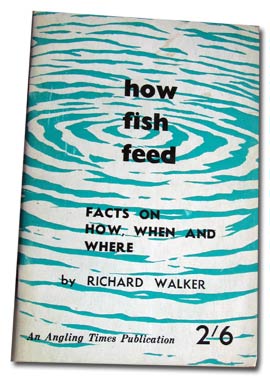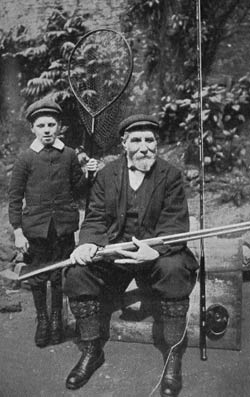| WATERCRAFT OR TECHNIQUE? In Bob Buteaux’s recent book ‘Fishing With The Famous’ there is a wordy and confused lament at the passing of ‘watercraft’. Having spent his formative years with some of the most intuitive anglers around, all Bob sees now is off-the-shelf technique. I can see where he’s coming from but has he got it all wrong? Perhaps those that practice watercraft to the nth degree have always been rare creatures, and so anglers like this are no rarer today than in the past. I’m going to look much more closely at how important these two factors are; is technique far more important? Or is watercraft the vital ingredient to success? And, of course, watercraft alone may not be enough to put fish on the bank if your technique is not up to scratch. There’s still more to this. Considerations of opportunity of where and when to fish, available tackle and bait must all be taken into account. What about guidance from other anglers, books, magazines, and, increasingly, the Internet? What’s watercraft all about? One of the most enjoyable ways to gain watercraft is simply making the most of any opportunity to spend time on the river or lake bank, and especially where you are able to simply watch fish swimming around in their environment. Take it a step further and feed them whilst doing so, and you can’t fail to start to observe the fishes’ habits.
Some of the time you will scare the fish away but if you keep still and are patient the fish will reappear. You may notice the effect of walkers or boats. You will see how different fish react to the scaring effect. Shouting at them scares some fish; yet, others react to a heavy (or not so heavy) footfall. Others may spot you. Some fish dash away as a shoal into weed, chub just drop deeper and melt away, trout dash for cover, and so on. There is no substitute for experience though some books may give you some clues (well worth reading are some of Dick Walker’s essays on fish behaviour). See how fish react to feed. It may take time for the bigger fish to respond. Some fish may be so wary of certain baits that they will actually leave the swim. Perhaps the best short cut is going fishing and observing fish in the company of an expert at this type of field craft. In this way, the inexperienced angler can learn to watch without being seen, and be given pointers to identify the little giveaway signs of fish activity. Even these vary from water to water. I’ve had tench feeding in my swim on two very different waters this season; a muddy drain with great patches of bubbles, and a hard bottomed gravel pit where the odd little cluster of two or three bubbles is the most you’ll see. Learn to recognise and know where to look for the little signs of fish. Pure technique
Match anglers often have to rely on this when faced with new venues that are featureless. Without the opportunity to get to know the venue beforehand and unable to see any fish, they rely heavily on top class technique, experience and up-to-date information from those in the know. Despite having to learn as they go along in match conditions, their technique carries them through. This does not mean that they never utilise watercraft, far from it, but mostly match fishing is all about technique. In my match fishing days, I have experienced the ultimate in this in a match on the Basingstoke Canal, a water that I had never fished. I was told what rig to use, supplied with the correct bait and groundbait, and fished with the necessary finesse. I had a good enough draw to win comfortably (a pound and a half of little roach on bloodworm on a bitterly cold day). Other branches of our sport follow a similar pattern. Many anglers like to fish familiar swims with favourite tactics. I think that this is where Bob Buteaux was missing the point. This has always been the case. Go back forty years and the average pleasure or match angler would sit on his basket, trotting his favourite porcupine quill, with double maggots on the hook. Dick Walker was often exasperated by this thoughtless approach, but is it any different from the modern angler that pitches up on a lake today, chucks a load of bait in, and fishes three rods with boilies? The average angler’s technique never was very good, and few have much watercraft. The Method – The Ultimate watercraft-free Technique? Other aspects of watercraft
Several writers have mentioned think bites, from J W Martin to Walker. I experienced this years ago when totally tuned in to some very big river roach. You instinctively sense when a fish is taking the bait, yet cannot explain it to those watching. Other examples come to mind, including one about the legendary Trent match ace John Dean. In one match John was catching a roach a chuck, when he suddenly shallowed up to three feet from six for one cast, caught a good chub, deepened up again and continued catching roach. When asked why, he shrugged his shoulders and replied, “I just knew it was there”. Here’s a challenge. Next time you have a couple of hours to spare, take a walk down a local bit of river (don’t forget your Polaroids), preferably one that is clear enough to spot fish in. Perhaps walk along a stretch that you’ve always fancied fishing but never quite got around to it. Try to figure out where you might find dace, chub, roach, perch, bream, or even barbel, depending upon what’s in there. What did you learn? I tried this on the Throop stretch of the Stour this week. Although the fish often shied away even before I got a chance to see them, by remaining still for twenty minutes the fish returned. I saw big roach to over 2lbs, and chub over 6lbs. My conclusion from all this is that anglers with a substantial degree of watercraft have always been comparatively rare, and it will remain so. Even those that possess it, don’t use it all of the time. There’s no law saying that they have to anyway. And, as for the great majority? Providing that that they enjoy their fishing, does it matter? Next week: ‘Summer River Roach’ |
Welcome!Log into your account
















